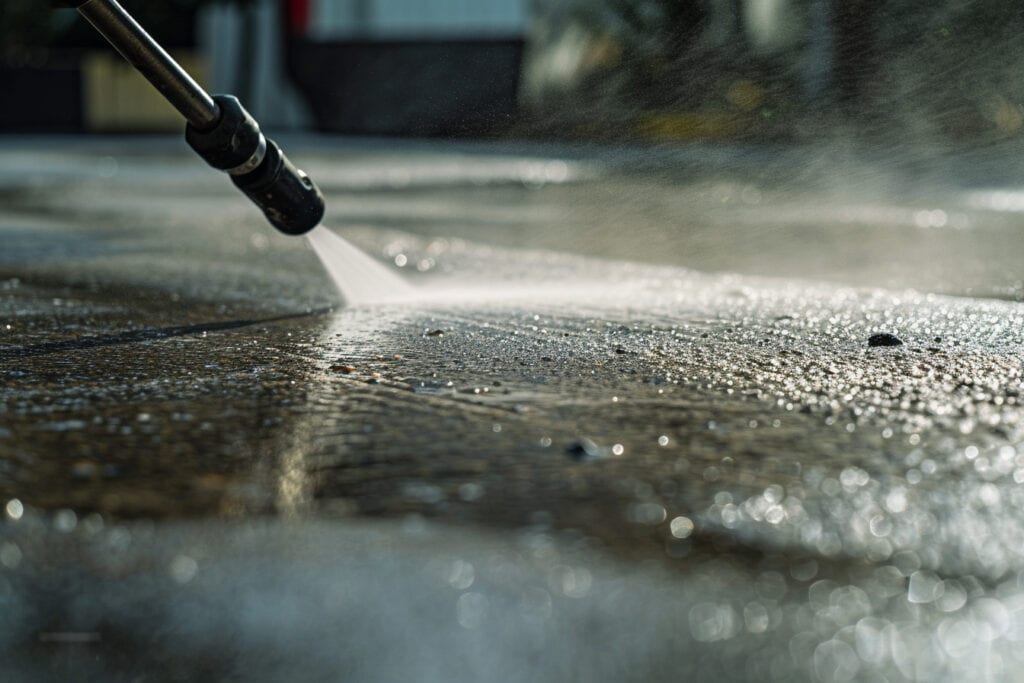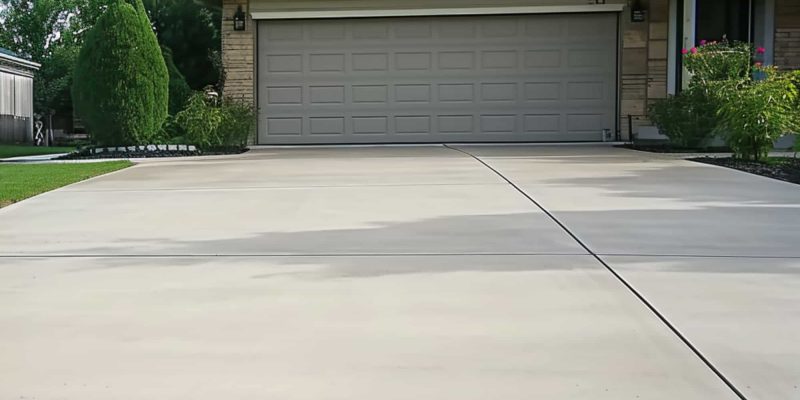Welcome, Rockford homeowners! A clean driveway is not just a reflection of your home’s pride but also a boost to your property’s overall appeal and value. Stains from oil, grease, rust, and leaves are common enemies of your driveway’s beauty, but fear not! This guide is here to arm you with effective strategies to battle these blemishes. Whether you’re dealing with a fresh spill or an old, stubborn stain on your concrete driveway, we’ve got the tips and tricks to help you restore its pristine look. So, let’s dive in and get those driveways sparkling clean!
Understanding Driveway Stains
Your driveway is the entryway to your home, constantly exposed to the elements and daily activities. Cars leaking fluids, metal objects rusting in the rain, and natural debris like leaves and dirt can all leave their mark. Each type of stain has its own set of challenges, but understanding their source is the first step toward effective removal.
Types of Driveway Stains and Their Causes
- Oil and Grease Stains: These are usually left behind by vehicles. Oil can drip from engines, while grease may come from automotive parts or maintenance work.
- Rust Stains: Caused by metal objects, such as tools, automotive parts, or lawn furniture, rusting over time and staining the concrete beneath.
- Organic Stains: Leaves, berries, and dirt can decompose on your driveway, leaving behind stains that can be surprisingly tough to remove.
- Other Common Stains: Paint spills, tire marks, and chemical spills can also stain driveways, each requiring a specific approach for removal.
Understanding the type of stain you’re dealing with is crucial, as it dictates the cleaning method you’ll need to use. Some stains can be cleaned with simple household products, while others may need specialized cleaners.
Preparing Your Driveway for Cleaning
Getting Ready to Clean
Start with a clean slate by removing any loose debris from your driveway. A stiff broom or leaf blower can be effective for this. Inspecting the driveway after clearing it helps identify the types of stains present and their severity.
Safety First
Before handling any cleaning solutions, protect yourself. Gloves protect your hands from harsh chemicals, while goggles can prevent splashes from irritating your eyes. Wearing old clothes or an apron can also protect your skin and clothing from stains or damage.
General Cleaning Techniques
Routine Maintenance
Keeping your driveway clean through regular maintenance is easier than dealing with accumulated stains. A simple mixture of dish soap and water can be effective for light cleaning. Use a stiff brush to scrub the mixture into the concrete, then rinse thoroughly with a garden hose.
The Power of Pressure Washing
For a deeper clean, a pressure washer can be invaluable. It’s especially effective for removing dirt and mildew. When using a pressure washer, start with a low-pressure nozzle to avoid damaging the concrete. Move the washer in a consistent, sweeping motion to evenly clean the surface without leaving streaks.
Specific Stain Removal Methods
Tackling Oil and Grease Stains
Oil and grease are among the most common but also the most stubborn stains you’ll encounter on your driveway. Here’s a detailed approach to tackling them:
- Initial Step: Before applying any solution, try to absorb as much of the oil or grease as possible using cat litter, cornstarch, or baking soda. Simply sprinkle your absorbent of choice liberally over the stain, let it sit for a few hours or overnight, then sweep it up.
- Degreaser Application: For stains that persist, a commercial degreaser or a homemade solution of baking soda and water can be effective. Mix enough baking soda into water to create a paste, apply it to the stain, and let it sit for 15-30 minutes. For commercial degreasers, follow the product instructions.
- Scrubbing: After the solution has had time to work, use a stiff nylon brush to scrub the area thoroughly. This agitation helps break up the oil or grease, allowing it to be washed away more easily.
- Rinsing: Rinse the area with hot water, as the heat helps dissolve oils, making them easier to wash away. A pressure washer set to a low pressure can also be effective here.
- Repeat if Necessary: Some stains may require multiple treatments, especially if they’ve been sitting for a while.
Addressing Rust Stains
Rust stains, while not as common, can be particularly noticeable due to their bright color. Here’s how to address them:
- Vinegar or Lemon Juice: Both white vinegar and lemon juice are acidic, which helps dissolve rust. Apply either directly to the stain and let it sit for about 30 minutes. Scrub the area with a brush then rinse thoroughly.
- Commercial Rust Removers: For more stubborn stains, a commercial rust remover designed for use on concrete can be more effective. These products often require you to wear protective gloves and eyewear, so read and follow the instructions carefully. Apply the remover, let it sit as directed, then scrub and rinse.
Removing Organic Stains
Organic material like leaves and dirt can leave behind unsightly stains when left to decompose on concrete. Here’s how to clean them up:
- Bleach Solution: Mix a solution of one part bleach to three parts water. Apply it to the stained area and allow it to sit for about 10 minutes. This method is effective but can lighten the concrete, so test it on a small, inconspicuous area first.
- Rinse Thoroughly: After applying the bleach solution, rinse the area well with water to remove any residual bleach, which could harm plants or alter the color of your driveway if left to sit.
Advanced Cleaning Techniques

When to Use Professional-Grade Cleaners
When household remedies fall short against persistent or large stains, professional-grade cleaners offer a stronger solution. These products are formulated with potent chemicals designed to tackle the toughest stains but require careful handling to prevent damage to your driveway or harm to yourself. Always wear appropriate protective gear and follow the product instructions meticulously. Testing the cleaner on a small, inconspicuous area first can help ensure it won’t damage your concrete.
The Benefits of Sealing Your Driveway
Applying a sealant after cleaning your driveway not only enhances its appearance but also provides a protective barrier against future stains and damage. Sealants can repel water, oil, grease, and prevent UV rays from fading the concrete. Select a sealant appropriate for concrete surfaces and consider factors like exposure to sunlight and the type of traffic your driveway endures. Applying sealant every 2-3 years can significantly extend the life and beauty of your driveway.
Preventative Measures
Regular Maintenance is Key
Establishing a routine cleaning schedule for your driveway can prevent the accumulation of stains and debris. Regular maintenance, including sweeping, rinsing with a hose, and spot cleaning spills as they occur, can keep your driveway in top condition and reduce the need for more intensive cleaning.
Protective Sealants Work Wonders
In addition to making cleanup easier, applying a protective sealant can safeguard your driveway from weather-related damage and wear from vehicle traffic. Choose a high-quality sealant designed for concrete driveways and follow the application guidelines for the best protection.
Act Fast on Spills
Quick action is crucial for preventing spills from becoming permanent stains. Keep a supply of cleaning agents, such as degreasers, rust removers, and absorbent materials like cat litter or baking soda, on hand for immediate spill response. The faster you address spills, the easier they will be to remove, preserving your driveway’s appearance and integrity.
Conclusion
A clean driveway is more than just an aesthetic asset; it’s a testament to the care you put into your home. With the right knowledge and a bit of elbow grease, you can tackle any stain and keep your driveway looking its best. Remember, regular maintenance and prompt action against spills are your best defenses against driveway stains. Happy cleaning, and here’s to a spotless driveway that welcomes you home every day!

